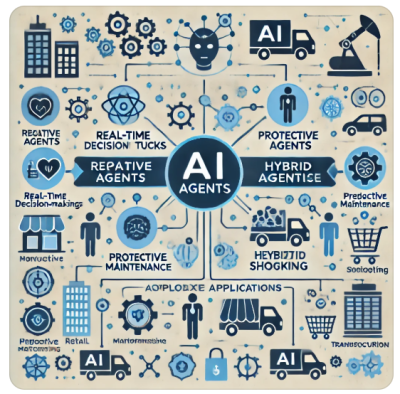Artificial Intelligence (AI) agents are revolutionizing business operations by automating repetitive tasks, enhancing decision-making, and driving efficiency. These intelligent systems use advanced algorithms and data to process inputs, analyze patterns, and execute tasks independently. This article delves into the key characteristics, types, applications, and learning processes of AI agents, along with their transformative impact across industries.
Key Characteristics of AI Agents
AI agents exhibit several defining traits:
- Autonomy: Operate independently without continuous human intervention.
- Reactivity: Quickly respond to environmental changes or new data inputs.
- Proactiveness: Anticipate future needs and act preemptively.
- Social Interaction: Collaborate with users or other systems to achieve optimal outcomes.
For instance, in supply chain management, their autonomy ensures smooth inventory tracking, while reactivity enables swift responses to demand fluctuations. By fostering collaboration, AI agents enhance team productivity.
How AI Agents Differ from Traditional Software
Traditional software relies on static instructions and predefined rules, whereas AI agents are dynamic and adaptive. Key differences include:
- Learning Over Time: AI agents continuously improve using historical and real-time data.
- Adaptability: They adjust actions based on new inputs or circumstances.
- Autonomy: They execute complex tasks with minimal manual guidance.
For example, traditional tools process invoices based on fixed parameters, while AI agents analyze trends, predict future needs, and automate workflows for greater efficiency.
Types of AI Agents and Their Roles
AI agents are categorized based on their functionalities:
- Reactive Agents: Respond to current inputs without memory, suitable for tasks like robotic controls.
- Proactive Agents: Use past experiences to predict and plan future actions, excelling in predictive maintenance and market analysis.
- Hybrid Agents: Combine reactivity and proactiveness, addressing both immediate needs and long-term strategies.
For example, proactive agents optimize supply chains by forecasting inventory shortages, while hybrid agents enhance customer service by balancing immediate and long-term requirements.

Applications of AI Agents Across Industries
AI agents have transformative applications in various sectors:
- Healthcare: Reactive agents monitor vital signs, while proactive agents predict patient needs, enabling better care.
- Retail: Hybrid agents personalize shopping experiences using real-time and historical data.
- Manufacturing: Proactive agents forecast maintenance needs to ensure uninterrupted operations.
- Transportation: Hybrid agents optimize routes and enhance safety in autonomous vehicles.
Their adaptability highlights their immense potential to reshape industries.
How AI Agents Learn and Improve
AI agents employ advanced techniques to refine their performance:
- Machine Learning: Identify patterns and improve through data analysis.
- Reinforcement Learning: Optimize actions with rewards for successful outcomes.
- Feedback Loops: Continuously gather and integrate real-world data to enhance their models.
For example, an AI agent used in fraud detection begins by identifying suspicious patterns and, over time, adapts to new techniques to improve accuracy.
Emerging Sectors Driving AI Agent Demand
The demand for AI agents is growing in sectors such as:
- Healthcare: Streamline patient monitoring and scheduling.
- Retail: Enhance customer engagement with intelligent chatbots.
- Finance: Automate compliance processes and detect fraud.
- Education: Provide personalized learning experiences with virtual tutors.
These industries are leveraging AI agents to achieve efficiency and scalability.
Challenges and Opportunities
Despite their potential, adopting AI agents presents challenges:
- Data Security: Ensuring privacy and protection against breaches.
- AI Governance: Establishing ethical and regulatory frameworks.
- Talent Shortages: Addressing the need for skilled AI professionals.
However, opportunities abound. Emerging technologies like edge computing enable real-time AI operations, while ethical AI practices foster trust. Companies addressing these challenges can lead the next wave of innovation.
Conclusion
AI agents are reshaping business operations with their precision, adaptability, and autonomy. Their applications span healthcare, finance, retail, and more, streamlining workflows and driving innovation. By addressing challenges and leveraging emerging opportunities, businesses can harness the full potential of AI agents to gain a competitive edge in today’s technology-driven world.

